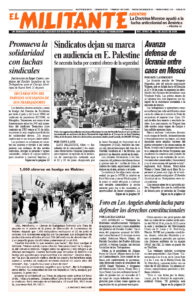LONDON — The jailing of Carla Foster for having an abortion during the eighth month of pregnancy has stirred discussion here about the broader impact of the deepening capitalist crisis on working people and the fight for women’s rights.
Foster, a mother of three children from Barlaston, Stoke-on-Trent, was sentenced to two years and four months in prison after pleading guilty to the breach of an 1861 law for administering drugs to get an abortion. She had recently gotten a job as an animal shelter worker and carried out the abortion shortly after moving back in with her estranged partner in 2020 during the pandemic lockdown.
“No one has the right to judge you because no one knows what you’ve been through,” Foster wrote just before sentencing.
Despite acknowledging that Foster had been “in emotional turmoil,” as she sought to hide the pregnancy, Judge Edward Pepperall rejected appeals for a lighter sentence.
Thousands protested the sentencing in London June 17 at a demonstration called by the British Pregnancy Advisory Service.
“This is not just about this woman,” Claudia Care, a ceramic artist, told Dag Tirsén, a member of the Communist League at the protest. “The law is an attack against all women.”
“What is it that leads many working-class women to need an abortion?” Tirsén said. “It’s the breakdown of the family, long shifts, low wages, young people not being able to afford to start a family. All these issues are union questions.”
Inflation remains at 11.3%, while the cost of hard-to-find child care is as much as 1,400 pounds ($1,780) a month, out of reach for many workers. These conditions highlight the need for the labor movement to lead a fight for a social program — for an adequate income, government-funded child care and more — that can eradicate the conditions that leave women confronting the kind of difficulties Foster faced.
What happened to Foster “is an outrage,” Peter Jaques, a junior doctor, told Tirsén. Jaques had recently joined the picket lines of health care workers striking for better pay.
Tirsén pointed to the pressures on workers and their families. “It’s not good that birthrates go down, and the number of abortions increases,” he said. In 2021, 214,869 women had abortions in the U.K., an all-time high since the procedure became legal in 1967. Abortion should be decriminalized, Tirsén said.
During pandemic lockdowns, abortion pills were made available by post for women seeking an abortion up to the tenth week of pregnancy. Foster got the pills by leading a medical consultant to believe she was seven weeks pregnant. The 1861 law used to prosecute her was amended in 1967 to allow women to have an abortion up to 28 weeks, later cut to 24 weeks, with the permission of two doctors.

